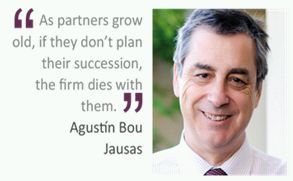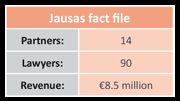 Barcelona-headquartered law firm Jausas says it is Spanish, not
Catalan, as it begins a new push into the Madrid market following
its recent merger with GMQ
Barcelona-headquartered law firm Jausas says it is Spanish, not
Catalan, as it begins a new push into the Madrid market following
its recent merger with GMQ
Though most of Jausas' business is done in Barcelona, the
firm's priority now is to establish a firm foothold in the
Madrid market. "Spain is a tale of two cities, you must be in
Barcelona and Madrid," says the firm's managing partner
Agustín Bou. "Madrid and Barcelona are very different
markets and it's almost impossible to cover Madrid from
Barcelona – 80 per cent of our business is done in Barcelona,
but we want to grow our tax, real estate and public law practice in
Madrid."
It was this desire to make an impact in the Spanish capital that
was the driving force behind Jausas' merger with Madrid firm
GMQ Abogados earlier this year. When announcing the merger in
January, Jausas said that it had taken the step in order to
"strengthen its presence in Madrid by incorporating a team of
professionals that will strengthen the commercial, M&A,
restructuring and insolvency, litigation, taxation, employment and
administrative practices".
We're not Catalan
Indeed, GMQ had been successful in building a relatively strong
brand in Madrid, but Bou says it was important that the
newly-merged entity was united under the Jausas brand. "We
wanted to have one single name and be one single firm – we
started in Barcelona, but we have had a presence in Madrid since
the 1980s, though the number of lawyers we have had there has gone
up and down in that time," says Bou. For example, Jausas
employment partner Ignacio Sampere and his team of 12 lawyers left
Jausas for BDO's Madrid office in 2015. "We want to grow
in Madrid, we consider ourselves a Spanish firm and not a Catalan
firm – some Madrid journalists seem to love putting the word
'Catalan' before our name," says Bou.
As a result of the merger, GMQ partners Rodrigo Martos and
Andrés de la Quadra-Salcedo became partners at Jausas. Bou
says one of the reasons for the link-up with GMQ was the fact that
the two firms share "major synergies" in their national
and international client portfolios. He adds: "They [GMQ] have
a good knowledge of the Madrid market, they are strong in public
law, M&A, litigation and real estate and we have the same type
of clients." Bou says that Jausas explored a number of
potential merger options before making the decision to merge with
GMQ. Prior to the merger, Jausas had three lawyers in Madrid, all
of whom moved into GMQ's office overlooking Madrid's Retiro
Park.
 Recruitment drive
Recruitment drive
The incorporation of the GMQ team will be followed by further
lateral hires in Madrid, according to Bou. "We're
currently working on recruiting people and we will expect to
recruit two partners in Madrid this year," he adds. The areas
that Jausas is particularly looking to strengthen in Madrid are
real estate, competition and tax.
The reported revenue figures for Jausas indicate that the firm has
been growing steadily in recent years. Total billing stood at
€8.5 million in 2017, an increase of 2.4 per cent on the
previous year's total of €8.3 million. In 2016, billing
totalled €7.9 million. Bou says M&A advice has been the
main driver of such growth and he predicts that the firm's
revenue will grow again this year. "We expect 2018 to be
better than 2017," he adds.
Investors don't care
Given that four-fifths of Jausas' business is in Barcelona, has
the political crisis in Catalonia – which has reportedly
resulted in at least 2,700 companies moving their headquarters out
of the region – had a negative effect on Jausas'
business? Not according to Bou. "The political uncertainty in
Catalonia has not impacted on our business," he insists.
"Investors in Barcelona are either local entrepreneurs or
multinational businesses that don't care about the political
situation." Bou also highlights Amazon's announcement that
it will open a new research centre and a seller support centre in
Barcelona, as evidence of investors being at ease with the
political developments in Catalonia. "There is stability in
Barcelona, it's a small geographical question, the situation
has not worsened [due to the political crisis]," says Bou. He
adds that, given that Catalonia contributes around 20 per cent of
Spain's gross domestic product (GDP), if investors lost
interest in Catalonia, it would be the whole of Spain that suffers
rather than only the region itself.
With regard to the biggest opportunities that currently exist for
Jausas, Bou highlights public law, real estate and M&A as the
key practice areas. With regard to public law, Bou says a key
driver of demand for legal services is litigation against municipal
authorities concerning developments in cities. Meanwhile, in the
area of real estate, residential property development in Barcelona
is booming.
Don´t let the firm die
Bou says one of the big challenges the firm faces is consolidating
its growth. For example, he highlights how integrating with other
firms can be problematic. "There are normally personnel
issues, at smaller firms you often have stronger personalities
– in Spain, we don't have the Anglo-Saxon culture where
we consider a law firm a business, we consider it as something that
is ours," explains Bou. However, despite this tendency to
think of a firm as being owned by its partners, Bou says
"renewing the firm" is one of Jausas' main
priorities. He says: "As partners grow old, if they don't
plan their succession, the firm dies with them. So, with regard to
lateral hires, we´re focusing on lawyers in the 35 to 45 age
range." 
Regarding what sets Jausas apart from its competitors, Bou argues
that the partners' high level of engagement with clients is one
of the firm's distinguishing features. "We have a close
relationship with the client that you don´t get from a larger
firm," he says. "We are all working partners who are
heavily involved in the practice – we could never compete
with big firms in terms of the number of people we put on a
transaction, but we [the partners] are always at the front."
Indeed, hard work will be required from all of Jausas' partners
in the coming months as the firm tries to fully integrate following
its recent merger, as well as make inroads into the fiercely
competitive Madrid legal market.
The content of this article is intended to provide a general guide to the subject matter. Specialist advice should be sought about your specific circumstances.
